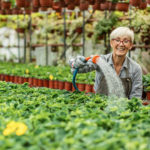Green Spaces, Later Menopause

This news comes from a 20-year-long study that included data on 1,955 women living in nine European countries. It found that those living in areas with limited access to green spaces reached menopause 1.4 years earlier than women living in the greenest areas whose average age at menopause was 51.7 years. Earlier studies have shown that living near green spaces is associated with a lower risk of obesity, depression, slower physical decline in old age and improved attention capacity in children. Study leader Kai Triebner of Norway’s University of Bergen noted that stress increases the level of cortisol in the blood and a number of studies have shown that exposure to green spaces helps reduce it. He added that “Low cortisol levels have been associated with increased levels of estradiol, an important female sex hormone. Perhaps women who live near green space have lower cortisol levels, which would allow them to maintain higher levels of estradiol, which may in turn delay the onset of menopause.” Later age at natural menopause has been positively associated with overall survival, life expectancy and reduced mortality.
Source:
Kai Triebner et al, “Residential surrounding greenspace and age at menopause: A 20-year European study (ECRHS),” Environment International, November 2019: doi.org/10.1016/j.envint.2019.105088
More from this week’s bulletin:
- Meat, Poultry & Heart Disease
- Another Reason To Eat Walnuts
- A Mediterranean staple: Preserved Lemons
Sign up for Dr. Weil’s Newsletters














